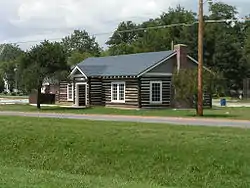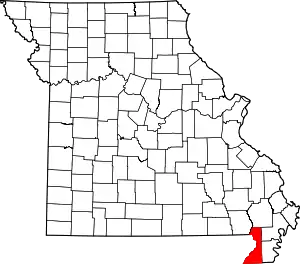Campbell, Missouri | |
|---|---|
 Campbell Visitors Center | |
| Motto: Peach Capital of Missouri | |
 Location of Campbell, Missouri | |
| Coordinates: 36°29′34″N 90°4′24″W / 36.49278°N 90.07333°W | |
| Country | United States |
| State | Missouri |
| County | Dunklin |
| Area | |
| • Total | 1.40 sq mi (3.64 km2) |
| • Land | 1.40 sq mi (3.64 km2) |
| • Water | 0.00 sq mi (0.00 km2) |
| Elevation | 315 ft (96 m) |
| Population (2020) | |
| • Total | 1,605 |
| • Density | 1,143.16/sq mi (441.24/km2) |
| Time zone | UTC-6 (Central (CST)) |
| • Summer (DST) | UTC-5 (CDT) |
| ZIP code | 63933 |
| Area code | 573 |
| FIPS code | 29-10864[3] |
| GNIS feature ID | 2393725[2] |
| Website | City website |
Campbell is a city in northern Dunklin County, Missouri, United States. The population was 1,992 at the 2010 census.
History
Campbell was originally called Four Mile, and under the latter name settlement was made in 1844.[4] The town site was platted in 1886, and the present name adopted from Alexander Campbell, a local judge.[4] A post office called Four Mile was established in 1855, and the name was changed to Campbell in 1882.[5]
Geography
Campbell is located in the northwestern part of the Missouri Bootheel at the intersection of US Route 62 and Missouri Route 53. Malden is seven miles to the northeast and St. Francis, Arkansas is 4.5 miles to the southwest on the St. Francis River. Kennett is approximately 17 miles to the south.[6]
According to the United States Census Bureau, the city has a total area of 1.40 square miles (3.63 km2), all land.[7]
Demographics
| Census | Pop. | Note | %± |
|---|---|---|---|
| 1900 | 737 | — | |
| 1910 | 1,781 | 141.7% | |
| 1920 | 2,025 | 13.7% | |
| 1930 | 1,592 | −21.4% | |
| 1940 | 1,786 | 12.2% | |
| 1950 | 1,931 | 8.1% | |
| 1960 | 1,964 | 1.7% | |
| 1970 | 1,979 | 0.8% | |
| 1980 | 2,134 | 7.8% | |
| 1990 | 2,165 | 1.5% | |
| 2000 | 1,883 | −13.0% | |
| 2010 | 1,992 | 5.8% | |
| 2020 | 1,605 | −19.4% | |
| source:[8] | |||
2010 census
As of the census[9] of 2010, there were 1,992 people, 799 households, and 495 families living in the city. The population density was 1,422.9 inhabitants per square mile (549.4/km2). There were 903 housing units at an average density of 645.0 per square mile (249.0/km2). The racial makeup of the city was 97.84% White, 0.10% Black or African American, 0.25% Native American, 0.05% Asian, 0.45% from other races, and 1.31% from two or more races. Hispanic or Latino people of any race were 2.11% of the population.
There were 799 households, of which 32.7% had children under the age of 18 living with them, 40.6% were married couples living together, 15.9% had a female householder with no husband present, 5.5% had a male householder with no wife present, and 38.0% were non-families. 32.7% of all households were made up of individuals, and 16.9% had someone living alone who was 65 years of age or older. The average household size was 2.40 and the average family size was 3.03.
The median age in the city was 39.8 years. 24.8% of residents were under the age of 18; 8.2% were between the ages of 18 and 24; 23% were from 25 to 44; 24.6% were from 45 to 64; and 19.4% were 65 years of age or older. The gender makeup of the city was 46.5% male and 53.5% female.
2000 census
As of the census[3] of 2000, there were 1,883 people, 853 households, and 499 families living in the city. The population density was 1,477.9 inhabitants per square mile (570.6/km2). There were 966 housing units at an average density of 758.2 per square mile (292.7/km2). The racial makeup of the city was 98.14% White, 0.58% Native American, 0.16% Pacific Islander, 0.27% from other races, and 0.85% from two or more races. Hispanic or Latino people of any race were 1.38% of the population.
There were 853 households, out of which 28.5% had children under the age of 18 living with them, 40.3% were married couples living together, 14.3% had a female householder with no husband present, and 41.4% were non-families. 37.5% of all households were made up of individuals, and 22.2% had someone living alone who was 65 years of age or older. The average household size was 2.21 and the average family size was 2.90.
In the city the population was spread out, with 24.7% under the age of 18, 8.2% from 18 to 24, 25.9% from 25 to 44, 21.3% from 45 to 64, and 19.9% who were 65 years of age or older. The median age was 38 years. For every 100 females, there were 88.9 males. For every 100 females age 18 and over, there were 81.3 males.
The median income for a household in the city was $21,838, and the median income for a family was $27,802. Males had a median income of $24,286 versus $17,000 for females. The per capita income for the city was $14,026. About 11.6% of families and 20.2% of the population were below the poverty line, including 27.0% of those under age 18 and 18.8% of those age 65 or over.
Education
Campbell R-2 School District operates one elementary school and Campbell High School.[10]
Campbell has a public library, a branch of the Dunklin County Library.[11]
Arts and culture
The city of Campbell holds many events for the town and surrounding areas, including Easter egg hunts in the softball fields, fireworks for the 4th of July, citywide yard sales, auto shows, craft fairs, senior citizen dances, Campbell High School annual reunions, and the annual Missouri Peach Fair.[12]
In 1944, the Campbell American Legion, local peach farmers, and local business owners hosted the first ever Peach Festival. This was initially a one-day event then, including a picnic where people could barbecue, and prizes given to the farmers with the best peaches. In 2011, the event expanded to become the official Missouri Peach Fair. It is now a seven-day celebration of a good year's harvest. It includes carnival rides, arcade games, food stands, pageant contests, and raffle drawings.
Notable people
- Carl Edward Bailey, Arkansas Attorney General (1934) and Governor (1937-1941)
- Jake Crawford, professional baseball player
References
- ↑ "ArcGIS REST Services Directory". United States Census Bureau. Retrieved August 28, 2022.
- 1 2 U.S. Geological Survey Geographic Names Information System: Campbell, Missouri
- 1 2 "U.S. Census website". United States Census Bureau. Retrieved January 31, 2008.
- 1 2 "Dunklin County Place Names, 1928–1945 (archived)". The State Historical Society of Missouri. Archived from the original on June 24, 2016. Retrieved September 29, 2016.
{{cite web}}: CS1 maint: bot: original URL status unknown (link) - ↑ "Post Offices". Jim Forte Postal History. Retrieved September 29, 2016.
- ↑ Missouri Atlas & Gazetteer, DeLorme, 1st ed., 1998, pp. 67 and 70, ISBN 0899332242
- ↑ "US Gazetteer files 2010". United States Census Bureau. Archived from the original on July 2, 2012. Retrieved July 8, 2012.
- ↑ "Missouri Population 1900 - 1990" (PDF). Missouri Census Data Center. Archived from the original (CSV) on July 4, 2014. Retrieved October 6, 2014.
- ↑ "U.S. Census website". United States Census Bureau. Retrieved July 8, 2012.
- ↑ "Campbell R-II School District". Great Schools. Retrieved March 17, 2018.
- ↑ "Locations". Dunklin County Library. Retrieved March 17, 2018.
- ↑ "Campbell's Official City Website". Archived from the original on January 28, 2011. Retrieved April 6, 2011.
External links
- Campbell's official city website
- Historic maps of Campbell in the Sanborn Maps of Missouri Collection at the University of Missouri
